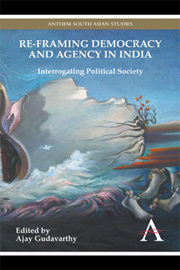Book contents
- Frontmatter
- Contents
- Preface and Acknowledgements
- List of Tables
- Chapter 1 Introduction: Why Interrogate Political Society?
- Part I Political Society and Protest Politics
- Part II Political Society, Middlemen and Mobility
- Part III Civil Society and/or Political Society
- Chapter 10 Clubbing Together: Village Clubs, Local NGOs and the Mediations of Political Society
- Chapter 11 Civic Anxieties and Dalit Democratic Culture: Balmikis in Delhi
- Chapter 12 The Habits of the Political Heart: Recovering Politics from Governmentality
- Chapter 13 Civil Society in the East and Some Dark Thoughts about the Prospects of Political Society
- Part IV Rejoinder
- List of Contributors
Chapter 13 - Civil Society in the East and Some Dark Thoughts about the Prospects of Political Society
from Part III - Civil Society and/or Political Society
Published online by Cambridge University Press: 05 June 2012
- Frontmatter
- Contents
- Preface and Acknowledgements
- List of Tables
- Chapter 1 Introduction: Why Interrogate Political Society?
- Part I Political Society and Protest Politics
- Part II Political Society, Middlemen and Mobility
- Part III Civil Society and/or Political Society
- Chapter 10 Clubbing Together: Village Clubs, Local NGOs and the Mediations of Political Society
- Chapter 11 Civic Anxieties and Dalit Democratic Culture: Balmikis in Delhi
- Chapter 12 The Habits of the Political Heart: Recovering Politics from Governmentality
- Chapter 13 Civil Society in the East and Some Dark Thoughts about the Prospects of Political Society
- Part IV Rejoinder
- List of Contributors
Summary
In Partha Chatterjee's idea of political society, we get one of the most original and insightful descriptions of contemporary Indian society and politics. Reading it now makes great sense in terms of how the state deals with the ordinary people of countries like India or even how people deal with the government everyday under a democracy. In spite of its originality and its great merits, I have been uncomfortable with the sense he makes of this idea of political society. At the risk of pre-empting the argument of this essay, I feel, the idea of political society has no future, not in the sense of what we would often be accused of in school or at home, but in the sense of the possibilities of imagining our futures, of utopias – scientific or superstitious; but, more of all that later.
In this essay, I shall do three things. First, I shall critically engage with the Western idea of civil society and enquire into the possibilities of civil society in the non-West; then, I shall critically engage with the concept of political society which Chatterjee advocates, instead of civil society. Finally, I shall try to argue out a case for a civil society suited to our societies and our futures.
The Idea of Civil Society
In a state-of-the-art essay on civil society, Sudipta Kaviraj identifies three contrasts, which help exemplify the meaning of civil society.
- Type
- Chapter
- Information
- Re-framing Democracy and Agency in IndiaInterrogating Political Society, pp. 289 - 302Publisher: Anthem PressPrint publication year: 2012
- 1
- Cited by



